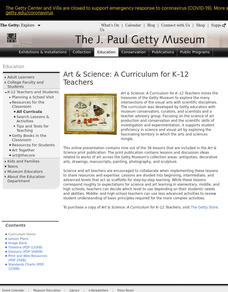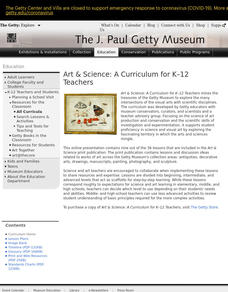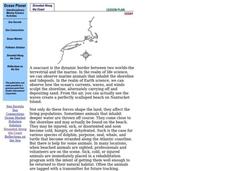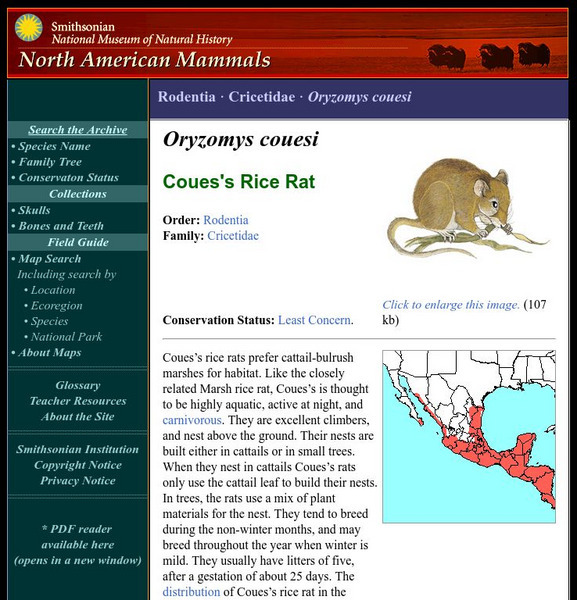Curated OER
Clearly Classified
Young scholars review the classification system for living organisms and apply it the classification of insects and flowers in the still life by Ambrosius Bosschaert. They create a chart classifying the animals and plants in the painting...
Alabama Learning Exchange
Endangered Species: What Are They And How Can We Help Them?
Students research endangered species online and prepare a presentation identifying species, and the reasons why species are becoming endangered,
Curated OER
Investigating Animals in Soil
Students investigate and observe small animal activity on a plot of land on their school grounds. In small groups they identify the five kingdoms of animals, stake out a small plot of ground, collect samples, record and analyze any data...
Curated OER
Power Totem
Students investigate the important symbols to Native cultures by writing a poem. In this animal totem lesson, students discuss animal spirits and their relation to the Native American lifestyle. Students write a cinquain poem about...
Curated OER
Beaver Ecology
Students explore the lives of bgeahvers. They identify the physical and behavioral adaptations that help beavers survive in their environment. Students compare and contrast how beavers influence the ecology of both forest and aquatic...
Curated OER
Mock Fly-Tying
Students make their own fly-fishing flies. In this aquatic macroinvertebrates lesson, students look at images of different species of aquatic macroinvertebrates. Students compare the similarities and differences among the...
Curated OER
Introduction To Insect & Spider Body Parts
Students inspect several different specimens of insects and spiders to determine characteristics that are similar and different between the two groups. They identify the basic body structure of spiders and insects and then predict where...
Curated OER
Animal Tracks
Students study animals. In this science lesson, students make plaster casts of animals that live in the area. Students identify the tracks.
Curated OER
Comparing Hares and Rabbits
Sixth graders research and investigate the Arctic hare and the snowshoe hare, and the order hares and rabbits. They explore an animal website and compare/contrast the two animals, recording their data on a chart.
Curated OER
Clearly Classified
Learners investigate plants and insects. In this science classification lesson, students create separate categories for insects and plants by characteristics. Learners discover scientific names of insects.
Curated OER
Web of Life
Students collect information about various organisms in a forest ecosystem and create a mural that depicts organism interdependence. They then simulate a food web using a ball of string.
Curated OER
Stranded Along The Coast
Students reflect and investigate how a seacoast is the dynamic border between two worlds-the terrestrial and the marine. In the realm of life science, we can observe marine animals that inhabit the shoreline and tidepools. In the realm...
Curated OER
Overpopulation
Young scholars examine population growth and how it impacts our environment. In this population instructional activity students identify the causes and consequences of overpopulation.
Curated OER
Now Take a Deep Breath
Students research to answer questions related to deep sea diving. In this deep sea diving lesson plan, students answer questions on a worksheet using the Internet. They discuss pressure, gas laws, and the physiology of diving in the deep...
Curated OER
Coloration
Students conduct an experiment picking out colored vs. camoflauged toothpicks out of the grass. They list and describe different types of coloration and explain how coloration assists the great horned owl and the striped skunk survive.
Curated OER
Survival in the Open Ocean
Students examine how scientists conduct pelagic research and identify pelagic predators as they study the open-ocean ecosystem. They discuss and conduct small group research of this environment in order to produce a presentation.
Curated OER
Investigating Animals in Water
Learners observe small animal activity. They identify local water animals and describe the habitats where water animals can be found. Students collect samples to observe in the classroom.
Curated OER
Winer Survival
Students study how animals need water, food, shelter, and space to survive. They also study what animals need to survive in the winter. They play the part of animals and winter "threats" in a game of tag to reinforce concepts.
Curated OER
Mound Cities
Learners learn about Mound Cities and how they both started and stopped. In this Mound lesson students explore how Mound Cities did not succeed and why. Learners dig deeper then the lesson as they discuss defeat and relate it to their...
Curated OER
Astronauts Train in Deep-Space Brine
Students examine an article on astronauts training in deep space brine then discuss what they learned. In this investigative lesson students get into groups and design an exercise that includes isolation, silence and conflict...
Smithsonian Institution
National Museum of Natural History: American Mammals: Coues's Rice Rat
Coues's rice rats prefer cattail-bulrush marshes for habitat. Like the closely related Marsh rice rat, Coues is thought to be highly aquatic, active at night, and carnivorous. Learn more about the Oryzomys couesi, more commonly known as...




















